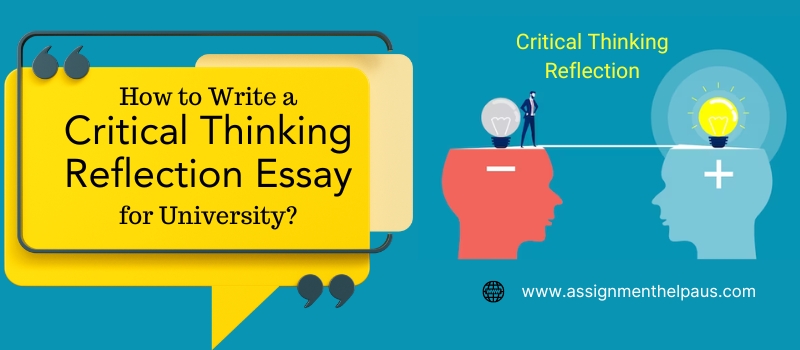Writing a critical thinking reflection essay for university requires you to engage in thoughtful analysis and evaluation of a particular topic, issue, or experience. This type of essay aims to demonstrate your ability to think critically, analyze information, and draw well-reasoned conclusions.
Essay writing is an essential assignment many students get in higher academic courses. Critical thinking is a part of this assignment that requires students to employ analytical and reflective writing skills. All the students who need to analyze and interpret data must know about this essential skill.
Critical thinking, a reflective essay, clarifies this for students confused with this term.
Are you ready to unlock the true potential of your mind? Join us in crafting a thought-provoking Critical Thinking Reflection Essay that will take your intellectual skills to new heights!
Critical Thinking Reflection Essay
A reflective essay is a type of writing where you must share your experiences, thoughts, and insights on a particular topic or event. It involves introspection and critical thinking as the writer analyzes their emotions, beliefs, and actions related to the subject. The essay explores the impact of the experience on the writer’s growth and learning.
Must Read: Significance of Utilizing Examples in Assignments
Reflective essays encourage self-awareness and offer valuable lessons to readers. The writer reflects on their perspective, identifies key takeaways, and considers how they must apply these lessons to future personal and academic development situations.
This guide will help you learn how to write critical thinking for a reflection essay. Have a look at each aspect, phase and learn the tips properly.
“Unlocking minds: Explore my critical thinking journey in this university essay, questioning assumptions and seeking truth.
What is a Critical Thinking Reflection Essay?
Critical thinking reflection essay means examining your thoughts, feelings, and experiences to understand them better. It involves various aspects of looking at things, like analyzing the situation from different angles, questioning your assumptions, and evaluating evidence to form well-informed judgments.
- Analyze, Question and Connect:
It is essential, to be honest with yourself and explore your strengths and weaknesses. Critical thinking helps you become aware of any biases or prejudices. When you read a book or listen to a lecture, you do not just memorize information; you analyze it, question it, and connect it to what you already know.
- Share the graph of change in thinking
In your reflection essay, share how your thinking has changed or grown. Discuss what you learned from the experience and how it might shape your future choices.
Also Read: How to Write Harvard Supplemental Essays?
How to Write a Critical Thinking Reflection Essay with a Complete Guide?
Writing a critical thinking reflection essay for university requires you to critically examine and evaluate your experiences, thoughts, and actions. It involves introspection, the ability to question and challenge your assumptions and beliefs.
A Step-By-Step Guide To Help You Write A Compelling Critical Thinking Reflection Essay:
Understand the Purpose: Before you start writing, grasp the purpose of the reflection essay. It is meant to explore your critical thinking skills and how your perspectives have evolved through an experience or learning process.
Choose a Relevant Topic: Select a specific event, situation, or learning experience that has been valuable for your personal growth or academic development. It could be a challenging project, a thought-provoking lecture, a book, or any experience stimulating your critical thinking.
Description and Context: Begin your essay by briefly describing the event or experience you are reflecting upon. Offer context and background information to help the reader understand the significance of the situation.
Introduce Critical Thinking: Clearly define what critical thinking means to you. Explain the key elements of critical thinking, such as questioning assumptions, analyzing evidence, considering different perspectives, and making reasoned judgments.
Reflect on the Experience: Start reflecting on the chosen experience. Use questions to guide your reflection process, such as:
- What were your initial thoughts and feelings about the experience?
- What assumptions did you have before the experience?
- How did the experience challenge or reinforce your existing beliefs?
- Were there any biases influencing your thoughts during the experience?
Also, explore the ultimate guide on How To Write A Good Argumentative Essay?
Analyze Your Thinking:
- Dig deeper into your thought process during the experience.
- Analyze the reasons behind your initial thoughts and actions.
- Were they based on evidence, emotions, or social influence?
- Did you consider alternative viewpoints?
Identify Learning Points:
- Discuss the key lessons you learned from the experience.
- Highlight moments when you engaged in critical thinking or where you missed opportunities to do so.
- Explain how your thinking has changed or evolved due to the experience.
Provide Examples and Evidence: Support your reflections and analysis with concrete examples from the experience. Use evidence to illustrate your growth and development as a critical thinker.
Address Challenges: Acknowledge any challenges you faced in applying critical thinking during the experience. Discuss how you overcame or could have better handled these challenges.
Conclude with Insights: Summarize the insights you gained from the reflection process. Emphasize how the experience has influenced your approach to critical thinking and decision-making in general.
Consider Future Application: Discuss how you plan to apply your improved critical thinking skills in future academic and real-life situations.
Edit and Revise: After finishing the first draft, review your essay for clarity, coherence, and conciseness. Ensure your thoughts flow logically and your critical thinking process is effectively conveyed.
Best Way to Write a Critical Thinking Reflection Essay and Get Higher Marks
This is to consider that a critical thinking reflection essay is about introspection, honesty, and the willingness to challenge your beliefs and actions. Avoid being overly self-critical; instead, focus on constructive growth and improvement.
As a university student, using critical thinking in your essays and other formats is crucial. This is how you can open space for impressing the professors and getting good marks.
Also, get Tips for writing a good – How to Write a Great Essay Quickly?
Structure, Format, and Referencing Styles Use in Perfect Critical Thinking Reflection Essay
A perfect critical thinking reflection essay’s structure characteristically comprises an introduction, body sections or paragraphs, and a conclusion.
- Introduction- sets the context and introduces the experience being reflected upon.
- Body- Paragraphs explore the experience, analyze thoughts, and showcase critical thinking skills. Each paragraph focuses on specific aspects or insights.
- Conclusion- Summarizes key takeaways and reflects on personal growth.
Also, go through the interesting blog on How To Write A Cause And Effect Essay?
What Is The Correct Format For a Critical Thinking Reflection Essay?
The format is usually in Times New Roman, 12-point font, double-spaced, with 1-inch margins. Use headings to organize different sections and maintain a clear flow.
Perfect Referencing style:
Referencing styles like APA, MLA, or Chicago may be used to cite sources if relevant information or external references are included in the essay.
Uses of R in Critical Thinking Reflection Essay
Bain et al. (e.g., 2002) developed a framework comprising five core stages, each dedicated to a specific reflection aspect. By considering these stages individually, you can address all essential components of reflection and create a critically engaged reflection based on your experience. This model is also useful for structuring reflective writing.
The five stages of writing critical thinking reflection are as follows:
- Reporting the context of the experience.
- Responding to the experience, including observations, feelings, thoughts, etc.
- Relating the experience to your existing knowledge and skills.
- Reasoning about the significant factors or theories that explain the experience.
- Reconstruct your practice by planning future actions for a similar experience.
Also, explore the affordable Essay Writing Help to shine in an online class.
Conclusion:
Critical thinking in a reflection essay allows you to become a better learner and make more thoughtful decisions in life. Writing the best critical thinking for a reflection essay includes choosing a topic, a brief description, including critical thinking, reflecting on the experience, analyzing the thinking, learning points, and providing examples. Learn the correct structure, format, and reference style. There are five stages of writing critical thinking reflection also, the 5R.


